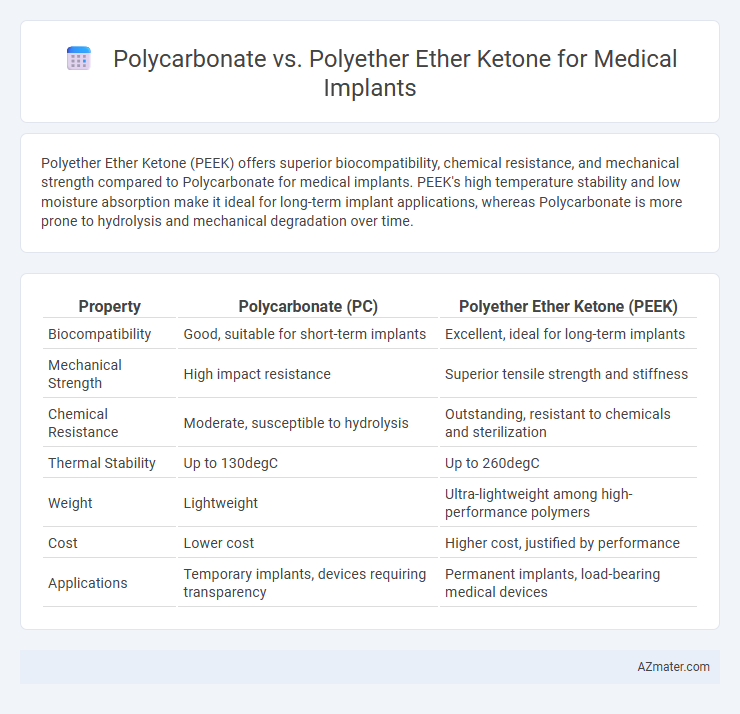Polyether Ether Ketone (PEEK) offers superior biocompatibility, chemical resistance, and mechanical strength compared to Polycarbonate for medical implants. PEEK's high temperature stability and low moisture absorption make it ideal for long-term implant applications, whereas Polycarbonate is more prone to hydrolysis and mechanical degradation over time.
Table of Comparison
| Property | Polycarbonate (PC) | Polyether Ether Ketone (PEEK) |
|---|---|---|
| Biocompatibility | Good, suitable for short-term implants | Excellent, ideal for long-term implants |
| Mechanical Strength | High impact resistance | Superior tensile strength and stiffness |
| Chemical Resistance | Moderate, susceptible to hydrolysis | Outstanding, resistant to chemicals and sterilization |
| Thermal Stability | Up to 130degC | Up to 260degC |
| Weight | Lightweight | Ultra-lightweight among high-performance polymers |
| Cost | Lower cost | Higher cost, justified by performance |
| Applications | Temporary implants, devices requiring transparency | Permanent implants, load-bearing medical devices |
Introduction to Polycarbonate and Polyether Ether Ketone
Polycarbonate (PC) is a durable thermoplastic known for its high impact resistance and transparency, making it suitable for various medical device components. Polyether Ether Ketone (PEEK) is a high-performance engineering polymer with exceptional mechanical strength, chemical resistance, and biocompatibility, ideal for long-term medical implants. Both materials offer distinct advantages in medical applications, where PC provides ease of fabrication and clarity, while PEEK delivers superior thermal stability and biocompatibility for implantable devices.
Material Composition and Structure Comparison
Polycarbonate (PC) is an amorphous thermoplastic composed primarily of bisphenol A and phosgene, offering high impact resistance but lower chemical and thermal stability compared to Polyether Ether Ketone (PEEK). PEEK is a semi-crystalline, high-performance polymer characterized by aromatic rings and ether and ketone linkages that provide exceptional mechanical strength, chemical resistance, and thermal stability up to 250degC, making it highly suitable for load-bearing medical implants. The molecular structure of PEEK results in superior biocompatibility and dimensional stability under physiological conditions, whereas PC's lower crystallinity leads to reduced long-term durability in implant applications.
Mechanical Strength and Durability Analysis
Polyether Ether Ketone (PEEK) demonstrates superior mechanical strength and durability compared to Polycarbonate in medical implant applications, exhibiting high tensile strength around 90-100 MPa and excellent resistance to wear and fatigue. PEEK's chemical stability and biocompatibility ensure long-term implant integrity under physiological conditions, whereas Polycarbonate, with tensile strength approximately 55-75 MPa, shows lower resistance to hydrolysis and mechanical degradation. The enhanced fatigue resistance and dimensional stability of PEEK make it a preferred choice for load-bearing implants requiring prolonged durability.
Biocompatibility and Safety in Medical Applications
Polyether Ether Ketone (PEEK) exhibits superior biocompatibility and chemical resistance compared to Polycarbonate, making it more suitable for long-term medical implants. PEEK's inert nature reduces the risk of adverse tissue reactions and metal ion release, enhancing patient safety in orthopedic and dental applications. In contrast, Polycarbonate, while biocompatible, may pose risks of degradation and inflammatory responses over extended implant durations.
Resistance to Chemicals and Sterilization Processes
Polyether Ether Ketone (PEEK) exhibits superior resistance to harsh chemicals and multiple sterilization methods such as autoclaving, gamma radiation, and ethylene oxide, making it ideal for long-term medical implants. In contrast, polycarbonate tends to degrade under prolonged exposure to aggressive sterilization processes and is more susceptible to chemical attack, limiting its suitability for certain implant applications. The high chemical inertness and thermal stability of PEEK ensure enhanced durability and biocompatibility in demanding clinical environments.
Wear, Tear, and Longevity in Implants
Polyether Ether Ketone (PEEK) exhibits superior wear resistance and mechanical strength compared to Polycarbonate, making it more suitable for long-term medical implants subjected to repetitive stress. PEEK's high chemical stability and resistance to fatigue extend implant longevity, reducing the risk of degradation and failure over time. In contrast, Polycarbonate may experience faster wear and tear under physiological conditions, limiting its durability in critical medical implant applications.
Processing and Manufacturing Differences
Polycarbonate offers easier processing with injection molding and thermoforming, providing faster cycle times and lower manufacturing costs compared to Polyether Ether Ketone (PEEK), which requires high-temperature machining or compression molding due to its high melting point of approximately 343degC. PEEK's processing demands specialized equipment and controlled environments to maintain its mechanical properties and biocompatibility, making it less adaptable for complex geometries than polycarbonate. The choice between polycarbonate and PEEK in medical implants heavily depends on manufacturing capabilities, with polycarbonate favored for cost-effective, rapid prototyping and PEEK preferred for high-performance, durable implants requiring rigorous sterilization.
Cost-Effectiveness for Medical Implant Production
Polycarbonate offers a cost-effective solution for medical implant production due to its lower material and processing expenses compared to Polyether Ether Ketone (PEEK), which commands a premium price because of its superior chemical resistance and high-temperature stability. Polycarbonate's ease of fabrication and availability contribute to reduced manufacturing costs, making it suitable for less demanding implant applications. Conversely, PEEK's enhanced biocompatibility and mechanical properties justify its higher cost in critical, long-term implant use where performance outweighs price concerns.
Clinical Performance: Case Studies and Outcomes
Polyether Ether Ketone (PEEK) exhibits superior clinical performance in medical implants compared to Polycarbonate, demonstrated by enhanced biocompatibility and mechanical stability in multiple case studies. PEEK's resistance to wear and chemical degradation supports long-term implant success, reducing postoperative complications and revision surgeries. Clinical outcomes indicate improved patient recovery rates and implant longevity with PEEK implants, particularly in orthopedic and spinal applications.
Choosing the Right Polymer for Medical Implantation
Polyether ether ketone (PEEK) offers superior biocompatibility and chemical resistance compared to polycarbonate, making it more suitable for long-term medical implants. PEEK's high mechanical strength and excellent resistance to bodily fluids ensure durability and safety in critical implant applications. Polycarbonate, while cost-effective and easily molded, lacks the comprehensive biological stability required for permanent implant use.

Infographic: Polycarbonate vs Polyether Ether Ketone for Medical Implant
 azmater.com
azmater.com